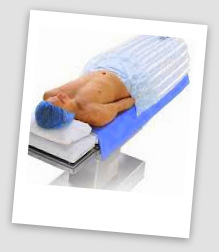The 3M Bair Hugger forced air warming blanket is back in the news again. Tracy Crawford, from Mississippi, recently filed a personal injury and product liability lawsuit, over the 3M Bair Hugger forced air warming blanket.

Crawford alleges that she developed a catastrophic knee surgery infection as a result of the 3M Bair Hugger forced air warming blanket, which is used during her orthopedic joint replacements.
The complaint was filed in the U.S. District Court for the District of Minnesota. Crawford claims that 3M Company and its Arizant Healthcare subsidiary sold and manufactured a defective and unreasonably dangerous warming blanket for use during hip and knee replacements.
This medical device is known as a Bair Hugger.
According to Crawford, the Bair Hugger forced air warming blanket was used to stabilize her body temperature during the knee procedure. But, the warming blanket device led to operating room floor bacteria and contaminants to enter her surgical wound, causing a debilitating knee infection.
After the knee replacement surgery, Crawford noted that her knee implant had to be removed and replaced with an antibiotic spacer because of deep seated joint infection. After many months of medical treatment, Crawford had another artificial knee placement, and she has required repeated surgeries since.
Growing Number of Hip and Knee Replacement Infection Lawsuits
There are several knee surgery infection and hip surgery infection lawsuits filed in recently against 3M over the Bair Hugger warming blanket. The complaints share similar allegations that after joint replacement surgery, patients developed catastrophic injuries, including infections, repeated joint surgeries, immobility and in severe cases amputations of knees and legs.
Application Filed For Multidistrict Consolidation
Recently, the U.S. Judicial Panel on Multidistrict Litigation (JPML) received an application to consolidate and centralize all Bair Hugger infection lawsuits nationwide against 3M Corporation. Centralization and consolidation is common in pharmaceutical and medical device litigation, because of the large number of lawsuits. This is known as Multidistrict Litigation (MDL).
It is anticipated that the MDL may end up in Minnesota federal court;, 3M’s world headquarters is based in Minneapolis. This MDL process allows efficacy and a speedier track to trials, when all the parties are under one roof and the litigation is shepherded by one judge.
What is the Problem with Bair Hugger Forced Air Warming Blanket?
The Bair Hugger warming blanket medical device is used during knee and hip orthopedic joint replacement surgeries in medical facilities nationwide.
During long surgical procedures, the body temperature tends to drop, because of a lack of movement by the anesthetized patient and the use of anesthetic agents. The hot air blanket was developed to reduce the risk of bleeding, stabilize core body temperature and lead to better surgical outcomes.
Unfortunately, the forced air system via the blanket, affects the laminar flow of the operating room, allowing bacteria from the floor to enter the surgical operative wound site.
Medical studies have demonstrated that the use of forced air warming blankets causes a significant number of contaminant particles in the surgical room air, which causes serious and severe knee or hip infections after joint replacement surgery.
3M Knew About the Infections But Failed to Warn
There are more than 50,000 Bair Hugger warming blankets in use in hospitals across the United States. According to the lawsuits, 3M knew about the hip and knee surgical infection risk for many years, but failed to make design changes or warn the doctors and hospitals.




